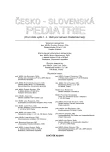-
Medical journals
- Career
The Problems of Inhibitor in Children Hemophilic Patients Observed at the Pediatric Hematology and Oncology Clinic, University Hospital Prague-Motol
Authors: V. Komrska; V. Čepeláková; J. Starý
Authors‘ workplace: Klinika dětské hematologie a onkologie UK 2. LF, FN Motol, Praha přednosta prof. MUDr. J. Starý, DrSc.
Published in: Čes-slov Pediat 2007; 62 (9): 505-510.
Category: Original Papers
Overview
Among 230 pediatric hemophiliacs registered by 31st March 2007 in the HemIS register (Hemophilia – Information System), there are 26 patients (11.3%) with a history of inhibitor, and only 6 of them (2.3%) have the evidence of an active inhibitor requiring treatment. Between 1990 and 2006 in the Second Department of Pediatrics and later in the Department of Pediatric Hematology and Oncology of the University Hospital Motol, 19 patients with an inhibitor were followed up, thirteen of them were treated with the objective of inhibitor elimination. Immunosuppressive and immune tolerance therapy was used. In 10 of 13 treated patients the therapy led to a permanent elimination of inhibitor, in 3 patients it did not succeed due to an early termination of therapy. One of these patients died at home due to an unrecognized retroperitoneal bleeding. A treatment algorithm based on our experience is proposed in the discussion.
Key words:
register HemIS, pediatric hemophiliacs, inhibitor, immunosuppressive treatment, immune tolerance treatment
Labels
Neonatology Paediatrics General practitioner for children and adolescents
Article was published inCzech-Slovak Pediatrics

2007 Issue 9-
All articles in this issue
- The Problems of Inhibitor in Children Hemophilic Patients Observed at the Pediatric Hematology and Oncology Clinic, University Hospital Prague-Motol
- Program of Hematopoietic Stem Cell Transplantation in Children at Department of Pediatric Hematology and Oncology, University Hospital Motol – from Fetal Liver to Cord Blood
- Unstable Hemoglobin Variants in Children of the Czech and Slovak Population
- Infection with Bacteria Pseudomonas aeruginosa in Patients with Cystic Fibrosis Diagnostics Possibilities and Clinical Outcomes of a Three-Year Study
- Body Height and Body Mass Index in Patients with MODY2 Diabetes (Glucokinase Defect) in Childhood and Adulthood – a Pilot Study
- Fifty Years of Successful Treatment of Childhood Acute Lymphoblastic Leukemi
- Disorders of Hemostasis in Newborns
- Czech-Slovak Pediatrics
- Journal archive
- Current issue
- Online only
- About the journal
Most read in this issue- Infection with Bacteria Pseudomonas aeruginosa in Patients with Cystic Fibrosis Diagnostics Possibilities and Clinical Outcomes of a Three-Year Study
- Disorders of Hemostasis in Newborns
- Unstable Hemoglobin Variants in Children of the Czech and Slovak Population
- The Problems of Inhibitor in Children Hemophilic Patients Observed at the Pediatric Hematology and Oncology Clinic, University Hospital Prague-Motol
Login#ADS_BOTTOM_SCRIPTS#Forgotten passwordEnter the email address that you registered with. We will send you instructions on how to set a new password.
- Career

